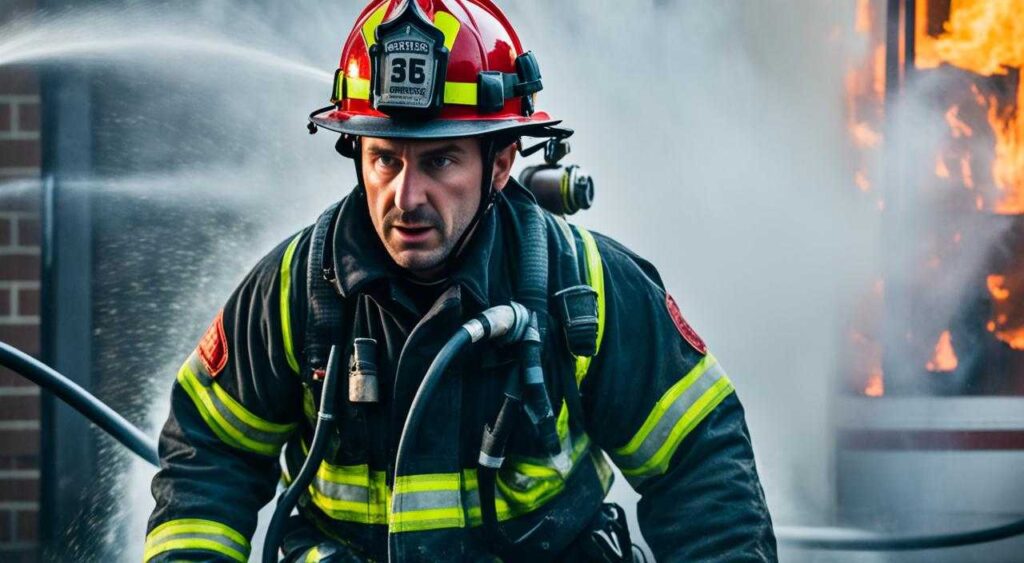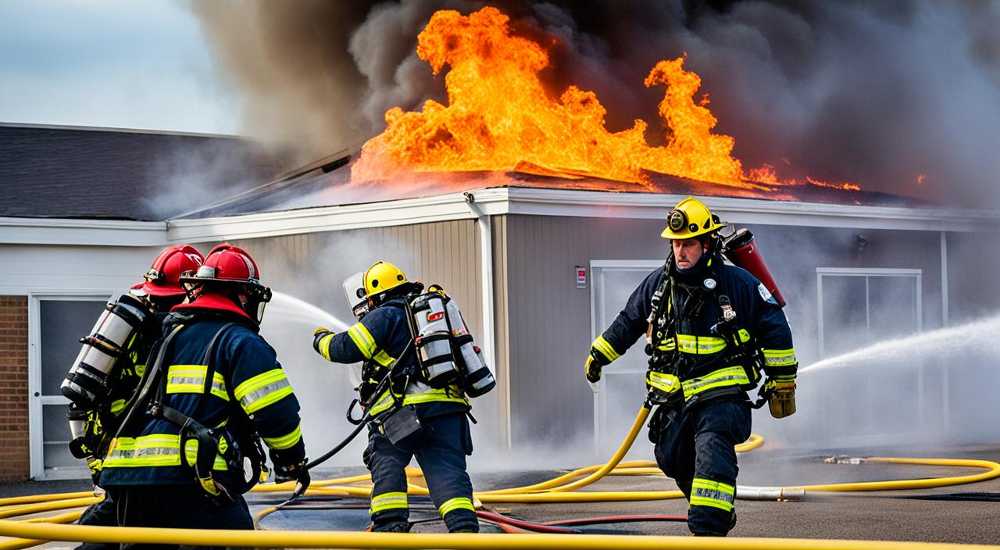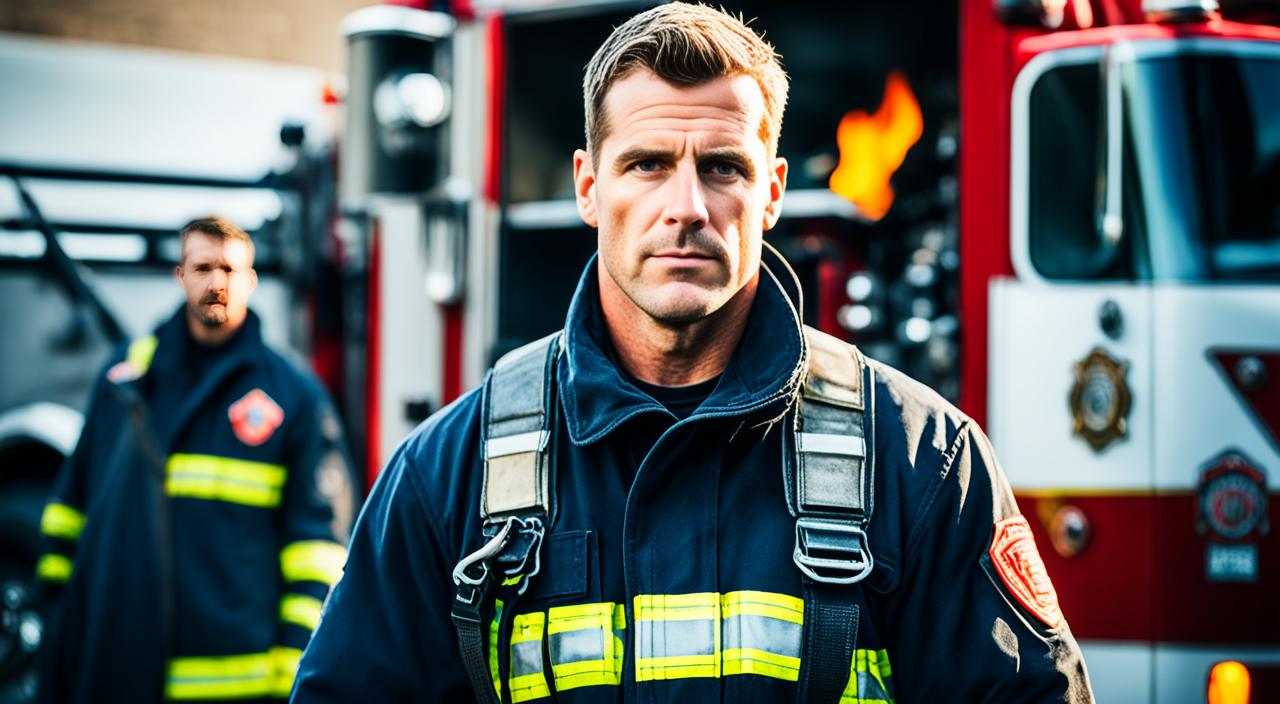Have you imagined bravely fighting flames and saving lives? But, have you worried that not having a college degree might hold you back? Let’s dispel that myth right away. You can become a firefighter without years in lecture halls or student debt. There are many no-college degree jobs in the fire service. They are especially at entry level. These jobs are essential to community safety.
Your journey to the firehouse starts with understanding this. The bravery of firefighting is open to you through training and a strong commitment to serve. Yes, you can turn your goals into actions. You can become a key part of the local emergency response team. Let’s explore the blazing path ahead. It leads to a fulfilling career as a firefighter without needing a college education.
Educational Attainment of Firefighters
The latest data is from the 2022 Current Population Survey (CPS) by the Bureau of Labor Statistics.
The majority (52.7%) have a high school diploma or equivalent as their highest level of education. Additionally, 27.9% have completed some college or an associate’s degree, while 19.4% possess a bachelor’s degree or higher. source
Salary Comparison by Education Level
The Bureau of Labor Statistics (BLS) also provides data on the median annual salaries of firefighters. The data is based on their education:
| Educational Attainment | Median Annual Salary |
|---|---|
| Less than High School | $45,960 |
| High School Diploma | $50,240 |
| Some College or Associate’s Degree | $53,880 |
| Bachelor’s Degree | $58,370 |
| Master’s Degree or Higher | $62,520 |
The data shows that firefighters with more education tend to earn higher pay. But, it’s important to note that factors like experience, location, and job type can also affect salary.
Firefighter Employment Projections
The BLS projects that the employment of firefighters will grow by 5% from 2021 to 2031. This is about as fast as the average for all jobs. This growth is due to the rising demand for emergency services. Also, the a need to replace retiring firefighters.
In 2021, the BLS said there were about 335,600 firefighters in the US. The projected employment numbers for firefighters in the coming years are as follows.
These stats and projections can vary. Factors include location, population growth, and changes in fire department budgets and policies.
Understanding the Basics of Firefighting as a Career
The role of a firefighter is often glamorized in popular media, but what does it truly entail? The job is not just about flames and smoke. It’s about protecting lives and property. And, it’s about building a strong community. You should know the depths of firefighter duties. You should know the skills and personal qualities needed to thrive in this work. Also, learning about firefighter job growth, stability, and benefits will set clear expectations. It will help as you consider this valiant path.

What Does a Firefighter Do?
A firefighter’s day-to-day duties extend far beyond the common perception of extinguishing blazes. These men and women are first responders who courageously confront various emergencies. This includes doing technical rescues and giving urgent medical aid. They also educate the public on fire safety. They are committed to emergency response. They are ready to act in both natural and man-made disasters. This shows the wide range of their vital duties. Let’s delve into what makes this career not only a job but a calling.
Required Skills and Personal Qualities
To excel in the firefighting field, certain skills and personal traits are non-negotiable. Fitness is key. The job is intense and needs great strength and endurance. Effective communication is key. Critical thinking is important. The ability to make quick decisions under pressure is also key. Also, teamwork is crucial. You’ll rely on a close relationship with your squad to face the job’s dangers. Let’s highlight some of these essential qualities:
- Problem-solving abilities – A sharp and analytical mind to navigate the intricacies of dangerous scenarios.
- Calm under pressure – Maintaining composure in the face of turmoil to make judicious decisions.
- Adaptability – Capable of responding effectively to the unpredictable nature of emergencies.
- Commitment to continuous learning – The willingness to stay updated with the latest firefighting techniques and medical practices.
If these qualities resonate with you, a future in firefighting may align well with your ambitions and capabilities.
Job Outlook and Benefits
When pondering a long-term career, stability is key. For firefighting, the job growth prospects are solid. The U.S. Bureau of Labor Statistics says the demand for firefighters will grow. This is due to factors like urbanization and a focus on fire prevention. As a firefighter, you may benefit from career stability. You will also get comprehensive healthcare. In many cases, you will get a sustaining pension. Here’s an overview of employment benefits that could be part of your future:
| Benefit | Description |
|---|---|
| Healthcare Coverage | Medical, dental, and vision plans for you and potentially your family. |
| Pension Plans | Security post-retirement, with plans often based on years of service and salary. |
| Time Off | Generous leave policies for vacation, illness, and personal days. |
| Professional Development | Continuous training and educational opportunities to advance your skills. |
| Community Impact | The intangible but profound fulfillment from serving and protecting your community. |
In return for your dedication, a career in firefighting can offer a purposeful life. You will get the satisfaction of providing a vital service to your fellow citizens. And as we have seen, the benefits extend beyond the immediate thrill of the job.
Wearing that uniform may excite you. You know firefighter job expectations and benefits. You are on the right track to pursuing a good and rewarding job.
Exploring the Requirements to Become a Firefighter
Becoming a firefighter is noble. It requires a unique mix of qualifications and personal strengths. Consider your journey into this vital profession. Understanding the standards for firefighter eligibility is essential. Most fire departments require candidates to have at least a high school education or it’s equal. Also, medical response is now vital in firefighting. So, many departments now require an EMT certification.
- High School Education: A high school diploma or GED certificate is the basis of your firefighting career. It gives you critical thinking and problem-solving skills.
- Physical and Medical Fitness: Firefighting is tough. You have to pass hard fitness tests to prove endurance, strength, and agility.
- EMT Certification: Many fire services expect you to be prepared for a range of emergencies. They focus on medical scenarios, so an EMT certification is often required.
Below is a table. It shows a detailed comparison of firefighter eligibility requirements. These requirements can vary by state or department.
| Requirement | Description | Why It’s Important |
|---|---|---|
| High School Diploma/GED | Baseline educational qualification | Ensures candidates possess fundamental academic competencies |
| Physical Fitness | Assessed through tests like the CPAT (Candidate Physical Ability Test) | Determines physical preparedness for the job’s demands |
| EMT Certification | Provides medical training relevant to emergency response | Enables firefighters to deliver critical care at the scene of an incident |
Fire departments across the country uphold these criteria. They do it to ensure their teams are skilled, tough, and ready to face any challenge. You could start your journey to becoming a firefighter today. You just need to commit to meeting these requirements. Remember, getting your EMT certification could open more doors. It will also better prepare you for the many parts of modern firefighting.
Solid preparation in high school, physical fitness, and EMT training is the trifecta for aspiring firefighters. – National Fire Academy spokesperson
How to Become a Firefighter Without College
If you’re aspiring to a fire service career without a degree, you’re in good stead. There are several ways to become an entry-level firefighter. In them, you gain the needed firefighter training for this tough but rewarding career.
Begin with understanding the minimum requirements. Most fire departments require candidates to have at least a high school diploma or GED. Next, consider getting an Emergency Medical Technician (EMT) certification. It is often a requirement or a highly valued qualification for a firefighter.

- Research local fire departments to understand their specific requirements and hiring process.
- Explore opportunities to volunteer with local fire service agencies for real-world experience.
- Engage in physical conditioning to meet the demands of the firefighter’s physical test.
- Prepare for the written exam by studying fire science basics and brushing up on your interview skills.
By taking these steps, you create a solid foundation on which to build your firefighting career.
Many fire service professionals started as volunteers or through cadet programs. These experiences gave them invaluable, hands-on experience.
I will now give you a better idea of the paths available to you. Here’s a comparison of the traditional college route and alternate paths:
| Traditional College Path | Alternate Pathways |
|---|---|
| Fire Science Degree | Volunteer Experience |
| Internship Opportunities | FIRE/EMS Cadet Programs |
| Academic Networking | Direct Application/Local Testing |
Remember, you don’t have to follow the conventional path to become a firefighter. You can start a fulfilling fire service career. Do it by using other training programs. Also, do it by doing volunteer work and working directly with fire departments.
Alternative Routes and Training Programs
Starting a career as a professional firefighter doesn’t need a college degree. There are many paths you can take. They provide key hands-on experience, mentorship, and specialized fire training. You need these to thrive in this tough field. Let’s explore the many learning opportunities. They can help you achieve life-saving courses and firefighting certifications. These are essential to this noble profession.
Fire Academy Training
Going to a fire academy is a key step. It’s on your journey to becoming a firefighter. These academies offer complete fire science education. It is designed to give you the skills needed to handle high-pressure situations. The training usually lasts a few months. It covers basic firefighting techniques, fire prevention, and emergency medical procedures.
Here are some respected fire academies known for their rigorous professional firefighter training:
- National Fire Academy (NFA)
- New York State Academy of Fire Science
- Texas A&M Engineering Extension Service (TEEX)
Apprenticeships and On-the-Job Training
For hands-on learners, firefighter apprenticeships offer both classroom knowledge and real experience. They are valuable. As an apprentice, you learn from experienced firefighters. They teach you about real-world fires and help you develop skills.
Mentorship from seasoned professionals can fast-track your learning process and provide you with the confidence to perform under pressure.
Certifications and Specialized Courses
Getting firefighting certifications is crucial. They will solidify your abilities and show your commitment to the profession. You often need these courses for career growth. They cover advanced first aid, handling dangerous materials, and operating fire trucks.
Authorities, such as the International Fire Service Accreditation Congress (IFSAC) and the National Board on Fire Service Professional Qualifications (Pro Board), give accreditations. They are prestigious endorsements of your expertise.
| Certification | Description | Issuing Organization |
|---|---|---|
| Firefighter I & II | Core firefighting skills and knowledge | IFSAC, Pro Board |
| EMT-Basic/Paramedic | Emergency medical service provision | National Registry of Emergency Medical Technicians (NREMT) |
| Hazardous Materials (HAZMAT) | Handling and response to hazardous substances | IFSAC, Pro Board |
These alternatives to college can guide you. They can lead to a successful career in the fire service. Fire academy instruction, apprenticeships, and targeted lifesaving courses make a potent toolkit. They are for any aspiring firefighter eager to help their community.
Preparing for the Physical and Written Exams
If you want to join the fire service, you must prepare for the firefighter physical test and fire department written exam. Becoming a firefighter is as much about endurance as readiness. It’s physical and mental. Here are some invaluable tips for your test preparation.
Start Early and Stay Consistent
- Create a regular study schedule for the written exam.
- Incorporate physical training into your daily routine.
- Focus on the components of endurance, strength, agility, and cardiovascular fitness.
Understand the CPAT
The Candidate Physical Ability Test (CPAT) is the standardized test for prospective firefighters. Make sure you understand the eight critical events of the CPAT:
- Stair Climb
- Hose Drag
- Equipment Carry
- Ladder Raise and Extension
- Forcible Entry
- Search
- Rescue
- Ceiling Breach and Pull
Seek Resources from Fire Departments
Join study groups, find mentors, and take advantage of test preparation programs offered by local fire departments or training centers to boost your confidence for the written exam.
When it comes to actual test preparation, here’s a breakdown of what to focus on:
| Area of Focus | Study Tips | Physical Training Tips |
|---|---|---|
| Written Exam | Review practice questions, learn test-taking strategies, familiarize yourself with firefighting terminology. | N/A |
| Mathematics | Brush up on basic math skills, including arithmetic and problem-solving. | N/A |
| Mechanical Reasoning | Understand mechanical concepts, practice with sample problems. | N/A |
| Physical Ability | N/A | Engage in strength training, cardio exercises, and specific CPAT event practices. |
| Endurance | N/A | Implement long-distance running and high-intensity interval training into your regime. |
Practice Makes Perfect
Remember, repetition is the mother of skill. The more you study and train, the better you will do on your journey to becoming a firefighter.
Conclusion
Starting your firefighter career plan takes more than a will to succeed. It needs a thoughtful approach to the key steps to become a firefighter. We’ve explored this throughout this article. Entering the fire service without a college degree is not just possible. It is a good option for many dedicated people. Consider each milestone. They go from understanding basic requirements to preparing for tough exams. They set a foundation for a strong start in this honorable career.
Summary of Key Steps
Your journey begins by meeting the criteria. It extends to getting key certifications, like EMT. Your next challenge is to pass physical and written exams. Then, come the valuable experiences of apprenticeships or fire academy training. Each of these elements is a strategic step in a full firefighter career path. The path prioritizes skill and real-world knowledge over traditional academics.
Maintaining Determination and Staying Motivated
As with any journey worth taking, career persistence is vital. Firefighters dedicate themselves. Their dedication goes beyond the physical. It is a mindset based on learning and commitment. Embrace the support and wisdom of those who walked the path before you. Stay focused on the rewards of serving your community. Remember, a firefighting career is not just about mastering skills. It’s about who you become. You determine and have guidance. Your goal of being a firefighter is near.
FAQ
Q: Can I become a firefighter without a college degree?
Yes, you can become a firefighter without a college degree. Many fire service entry-level jobs require only a high school diploma or GED. They also require specialized training and certifications, such as EMT.
Q: What are the main responsibilities of a firefighter?
A firefighter’s main jobs are fighting fires and doing rescues. They also respond to emergencies, give medical aid, and do community service.
Q: What skills and personal qualities do I need to be a firefighter?
Firefighting requires fitness. It also requires problem-solving, strong communication, teamwork, and critical thinking. Firefighters must stay calm under pressure.
Q: Is there job growth in the firefighting profession?
Yes, the U.S. Bureau of Labor Statistics says this. They expect job growth in firefighting. This career also offers stability and various employment benefits.
Q: What basic requirements must one meet to enter the fire service?
To enter the fire service, you need a high school diploma or GED. You must also meet physical and medical fitness standards. You must often hold an EMT certification.
Q: What are alternative routes to becoming a firefighter aside from college?
You can also become a firefighter through other routes. These include volunteer work, cadet programs, and applying directly to fire departments. You can also enroll in fire academy training. You can also join apprenticeship programs. And, you can pursue certifications and specialized courses.
Q: What does fire academy training involve?
Fire academy training involves classroom learning. It also includes hands-on experience. It covers fire science, firefighting, and lifesaving.
Q: Are there apprenticeships available for aspiring firefighters?
Yes, there are firefighter apprenticeship programs. They offer on-the-job training and mentorship from experienced firefighters in fire departments.
Q: What certifications might I need as a firefighter?
Firefighters may need many certifications. For example, in fire equipment use, hazardous materials handling, and advanced first aid. Organizations like IFSAC and Pro Board provide recognized certifications.
Q: How should I prepare for the firefighter physical and written exams?
Preparing for the firefighter physical test and written exam involves physical training. You also need to study fire science and emergency response. You may also attend test prep courses to get ready.
